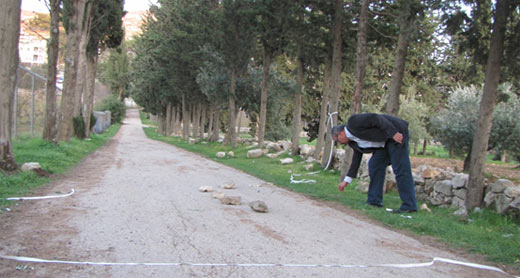Father of young woman killed by soldiers petitions High Court to oblige MAG to handle case promptly
B'Tselem
 |
On 23 January 2013 Lubna al-Hanash, a 21-year-old resident of Bethlehem, was strolling with a female relative in a garden near Route 60 by al-'Arrub Refugee Camp, when she was struck in the head by soldiers’ live gunfire. She was taken to hospital in Hebron, where she died of her wounds shortly afterwards. In the course of the shooting, al-Hanash’s relative sustained a gunshot wound to the hand. B’Tselem’s inquiries found that the two women posed no danger to anyone and therefore, shooting at them was entirely unjustified. On the very day of the incident the MAG Corps announced that the Military Police had launched an investigation. Yet, in the 14 months since and although the investigation was concluded in October 2013 at the very latest, the MAG has yet to render his decision whether to indict the offenders or close the case. The petitioners’ legal counsel, Att. Gaby Lasky, noted that every day that goes by without a decision by the MAG reduces the chances that effective criminal procedures be taken against the perpetrators. This constitutes an ever-increasing infringement of the rights of the deceased’s family. It also results in greater harm to the rule of law and to public interest in bringing offenders to justice. With respect to the handling of the case, the petition further noted that, "in the face of the gravity of the suspicions in this case, the inexplicable, insufferable delay in bringing the perpetrators to justice, for which law enforcement authorities are responsible, and the Respondent chiefly so, constitutes a blatant breach of the law enforcement authorities’ obligations, under both Israeli administrative law and international law. This unreasonable conduct is extremely injurious to the rule of law and to the rights of the petitioners, and conveys disregard for human life. To prevent further harm, the Respondent must be obliged to give his decision without delay." Justice Neal Hendel directed the State to respond to the petition by 2 June 2014. The incident: Lubna al-Hanash of Bethlehem was just shy of her 22nd birthday. On 23 January 2013, she went to visit a relative, Sou’ad al-Hanash, 38, a resident of al-'Arrub RC. The two women went for a stroll along the garden paths in the nearby College of Technology, which serves as a recreation area for al-'Arrub residents. At approximately 2:30 P.M., they were walking towards an entrance gate to the college, located on Route 60, from where Lubna was supposed to travel back home. When they were about 100 meters away from the gate, shots were suddenly fired at them. At this point, Sou’ad perceived the soldier who shooting at them. He was standing by the road, on the other side of the closed gate. Lubna sustained a gunshot wound to her head and Sou’ad to a hand. The two women were taken separately to Al-Ahli Hospital in Hebron, where Lubna died of her wounds about an hour later.  B’Tselem field researcher Iyad Hadad examines the scene of the incident. Photo by Musa Abu Hashhash, B’Tselem, 23 Jan. 2013
That same day, Sou’ad al-Hanash related the events to B’Tselem field researcher Musa Abu Hashhash:
We walked around the campus – which was empty, with no students or teachers around, for about an hour and a half. At around 2:30 P.M., I was walking with Lubna towards the side entrance that leads to Route 60. She wanted to wait there for a ride back to Bethlehem. We were walking down the pine tree path when suddenly, I heard several shots. Right away, I noticed a soldier in uniform standing on the other side of the closed gate, about 100 meters away from us. Behind him was a parked white car, facing in the direction of Hebron. As soon as I turned around to run away, I felt something hit my left hand. I realized I’d been hit by the gunfire and I started running, leaving Lubna behind. I thought she was running just behind me. I ran about 50 meters, until I saw two people from the college staff. One of them bandaged my hand and the other went to find Lubna.In an article that Israeli daily Ha’aretz ran on the day of the incident, the IDF Spokesperson was quoted stating that a soldiers who were "driving along the road were attacked with stones and Molotov cocktails, and the soldiers, who felt they were in danger, opened fire at the source of the stone-throwing." Later that day, it was reported that an officer in Central Command said that a bag containing several Molotov cocktails had been found in the area, but the IDF Spokesperson would not say whether the women had been the target of the gunfire. Media reports further indicate that the soldiers involved in the incident were Lieut. Col. Shahar Safda, Second-in-command of the Yehuda Brigade, and another soldier. They were driving along Route 60 in a civilian car when they noticed stones and Molotov cocktails being thrown, at which point they decided to stop and get out of the car. They then opened fire and tried to pursue the stone-throwers. B’Tselem’s inquiries have been unable to confirm or refute the claim that stones and Molotov cocktails had been thrown in the vicinity prior to the shooting. They did find, however, that Lubna and Sou’ad al-Hanash had nothing to do with the alleged assault and – as can be gleaned from Sou’ad’s testimony – were unaware of it. Therefore, there was no justification for firing at the women. The military’s response makes no mention of the fact that the two passersby were hit by the gunfire, nor that firing live ammunition at the upper torso is permitted only when the targeted individual poses immediate mortal danger to soldiers or civilians, which was clearly not the case in this instance. |
No comments:
Post a Comment